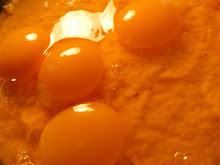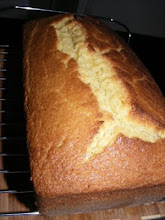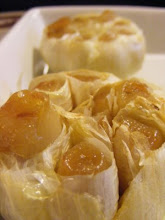


Sometimes we're faced with the fact that we don't know as much as we think we know. Or better put, we don't know everything within our field of expertise. Recently, I was faced with such a discovery about myself, and that discovery came to me in the form of the simple procedure known as brining. I had never done it!
When faced with the reality of cooking Christmas dinner for two this year, I decided to roast a nice chicken rather than a turkey. Actually, the truth be known, I'm kind of tired of turkey. I like tradition as much as anyone, but I have been roasting turkey twice a year for a long time and I have decided that I will mix it up a bit from now on. But this year I was cooking for two, and I just didn't want to be bothered dealing with leftovers well into the new year.
Anyway, I decided to roast chicken this year, so I went to see Tony, my local butcher. He had some beautiful little five pounders that caught my eye, so I got two (yes two!) as well as 10 pounds of bones for my stock. This was going to be a chicken dinner worth remembering!
The reason I got two chickens was because I had a request to brine the chicken before I roasted it. I had never brined anything in my life, and as far as I was concerned, brining was a procedure meant to infuse moisture into a piece of meat - or in this case, a fowl - where moisture would be lost during the roasting process. I always thought that my roasts and fowls were nice and moist and I didn't need to resort to brining to turn out a nice finished product.
I agreed to brine the chicken but I thought I would get a second and roast it as usual to compare the two. There was a huge difference!
This particular brine incorporated tea, oranges, salt, brown sugar and bay leaves. The mixture was heated, then cooled, and the chicken was submersed in it for a day. After brining, the chicken had a golden color to it from the tea; the skin and flesh both had a deep golden/orange hue. The chicken was also a little plumper than it had been prior to the brining due to the fact that some of the brine had been absorbed into the flesh of the chicken.
I seasoned and filled the cavity of both chickens with herbs , oranges and lemon and roasted them side by side. The chicken that had been brined was a dark brown color after roasting, whereas the unbrined chicken was the usual golden brown. This was an interesting contrast.
Once the chickens were carved into, I can't say as I found a noticeable difference in the moisture content between the two birds. Both were juicy. I tasted the two and found that the brined chicken had a really amazing flavor not present in the other chicken. I could taste the tea and orange in the flesh and it was incredibly tasty! I was actually very impressed with this!!
Having done this experiment and seeing for myself the results of brining, I can see the possibility for so many flavor combinations. Not only are the flavor combinations extensive, but small cuts of meat can be brined as well as the larger ones. Why not brine chicken parts, chops and steaks? After all...brines can be little more than wet marinades.
Orange Herbal Chicken Brine
5 cups hot water
6 orange-flavored herbal tea bags
1 cup kosher salt
2/3 cups brown sugar
4 bay leaves
2 tsp dried rosemary
1 6-7 lb roasting chicken
In an 8 quart non aluminum pot, combine the first six ingredients and stir until salt and sugar are thoroughly dissolved. Add 9 cups of cold water. Place chicken in brine, neck side down, and cover. Refrigerate for 8 hours, or over night.
Roast chicken at 325 degrees for 15 minutes per pound.











































































5 comments:
Can you use Orange Pekoe flavored tea bags or is it preferrable to use orange herbal flavored tea bags?
your recipe indicates 2 tablespoons of dry Rosemary,would you use 2 tablespoons of fresh Rosemary for this recipe if I wanted to substitute the dry for fresh?
I used Orange Pekoe for this, yes, but the recipe called for herbal orange. I used what I had. And really...that is the key to improvisation in cooking. Look for ingredients that will work in place of others.
In this case, tea is tea. That's not to say that the flavor will be the same no matter what tea is used, but the infusion of any tea into a brine will transfer flavor. And in this particular case, Orange Pekoe pairs well with the oranges.
Nuff said?
Here's a quick tip on using herbs:
Dry herbs need to have their flavor released through cooking. That is, the flavor is released with heat and/or moisture. Fresh herbs have flavor regardless of whether they are cooked or not.
How does this effect their use? Well...add dry herbs at the beginning of cooking to release the flavor and add fresh herbs at the end. I usually prefer fresh to dry because I find the flavor immediate and they add color to a dish giving visual appeal. Cooking fresh herbs for a long period, or at too high a heat, destroys the chloraphil and the color is lost. The flavor is the same, however.
So, to answer your question, fresh herbs have less concentrated flavor than dry, so you would use more.
Nice! Will be doing this for Canadian Thanksgiving.
Post a Comment